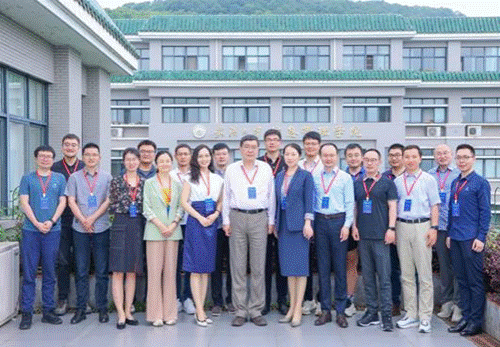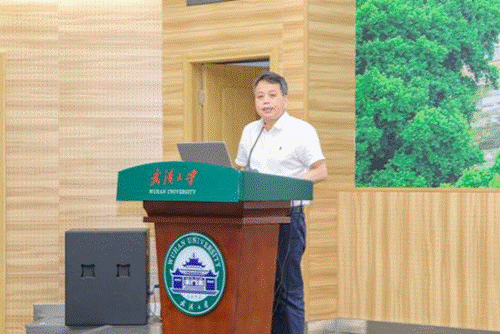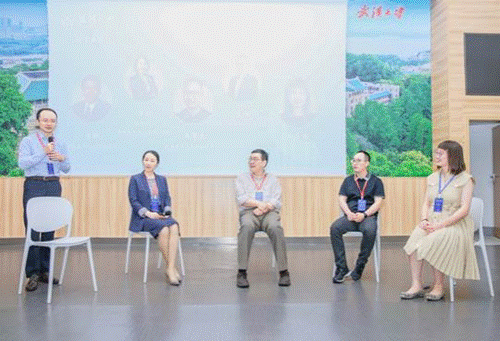On May 20, the 7th Quantitative Information Analysis—Forum on Science and Technology Policy Research was held in Wuhan University. The Forum was co-sponsored by the Science and Education Management and Evaluation Center of Wuhan University, Center for Studies of Information Resources, Wuhan University, Wuhan Data Intelligence Research Institute and our School. Nearly 400 experts, scholars and graduate students from more than 100 universities and scientific research institutions in China attended the Forum. Lin Zhang, Professor at our School, presided over the Forum.

Falin Zhang, Professor and Associate Dean of the Academy of Humanities and Social Sciences, Wuhan University, addressed at the Forum. He pointed out that the Quantitative Information Analysis—Forum on Science and Technology Policy Research, as an open communication platform to share and exchange cutting-edge achievements in the field of science and education management and promote academic cooperation in related fields, focuses on the related issues of process management, resources allocation and decision-making in the field of scientific research assessment and management, strengthens the guidance and implementation of organized scientific research, serves the decision-making of the Party and the government, and contributes to the realization of high-level science and technology self-reliance.

The Forum was held in a combination of reality and virtual meeting, including two thematic report sessions and one round-table forum.
In the first thematic report session, Xianwen Wang, Professor at Dalian University of Technology, with the theme of The Speed of Peer Review Reflects the Attractiveness of Articles, proposed to make important articles more interesting, so as to achieve a win-win result between authors and reviewers.
Li Tang, Professor at Fudan University, gave a report entitled International Flights, Scientific Research Cooperation and Talent Flow, and analyzed in detail the relationship between direct flights between the United States and China, international talent flow and Sino-US cooperation.
Jiang Li, Professor at Nanjing University, started with Thomas Kuhn's relevant theories on transformative research, and answered the question “Is scientific progress getting slower and slower?” with quantitative analysis results.
Jian Du, Assistant Professor at Peking University, took the topic of Mining the Positive and Negative Results in Medical Research, and extended it from the publication bias between negative and positive results in medical research to the uncertainty research in medical knowledge, and made relevant analysis on it.
Based on the whole chain data, Lin Zhang discussed the interaction mechanism of "fund-science-technology-policy" with four sub-studies, such as How Government Funding Drives the Innovation in Technology.
Cong Cao, Professor at University of Nottingham Ningbo China, commented on the thematic reports.

In the round-table forum, Cong Cao, Li Tang, Xianwen Wang and Chenwei Zhang, Assistant Professor at the University of Hong Kong, participated in the discussion. The Forum discussed the subject development and frontier issues in many aspects, such as What are the Frontier Questions in Scientometrics and Science and Technology Policy Research, What Will Scientometrics be Like in the Next Decade, What Challenges are Scientometrics Facing, and How to Deal with the Challenges Faced by Scientometrics, etc. Jiang Li presided over the round-table forum.

The second thematic report session was held virtually.
Ying Ye, Professor at Nanjing University, discussed the impact and opportunities brought by new technologies with the topic of Discussions on the Changes Caused by ChatGPT.
Liying Yang, Researcher at Chinese Academy of Sciences, gave a report entitled Some Thoughts on the Evaluation of Academic Journals, and analyzed in detail the development and upgrading process of Journals Ranking Table by the National Science Library, Chinese Academy of Sciences.
Yutao Sun, Professor at Dalian University of Technology, taking China as an example, discussed the system reform and the allocation of science and technology funds of the central finance. He pointed out that with the advancement of reform, the allocation of science and technology funds of the central government has undergone an evolutionary process from decentralization to centralization, and the allocation of funds and the division of labor among personnel have become clearer;
Xiaozhong Liu, Associate Professor at Worcester Polytechnic Institute, took the topic of Strengthening Effect of Filtering Bubbles in the Era of Large-Scale Language Model, starting with examples in life and academic research, and interpreted how the "filtering bubbles" effect was strengthened and changed human life under the impact of new technologies.
Cong Cao commented on the thematic reports and discussed with several scholars about new technologies such as ChatGPT.
Li Tang presided over the second thematic report session.
The 7th Quantitative Information Analysis—Forum on Science and Technology Policy Research was supported by the International Cooperation Working Committee of the China Society for Scientific and Technical Information, the Youth Working Committee of the Chinese Association of Science of Science and S&T Policy Research, Scientometrics and Informetrics Committee of the Chinese Association of Science of Science and S&T Policy Research, Documentation, Information & Knowledge (in Chinese), Journal of Information Resources Management (in Chinese), and Data and Information Management.